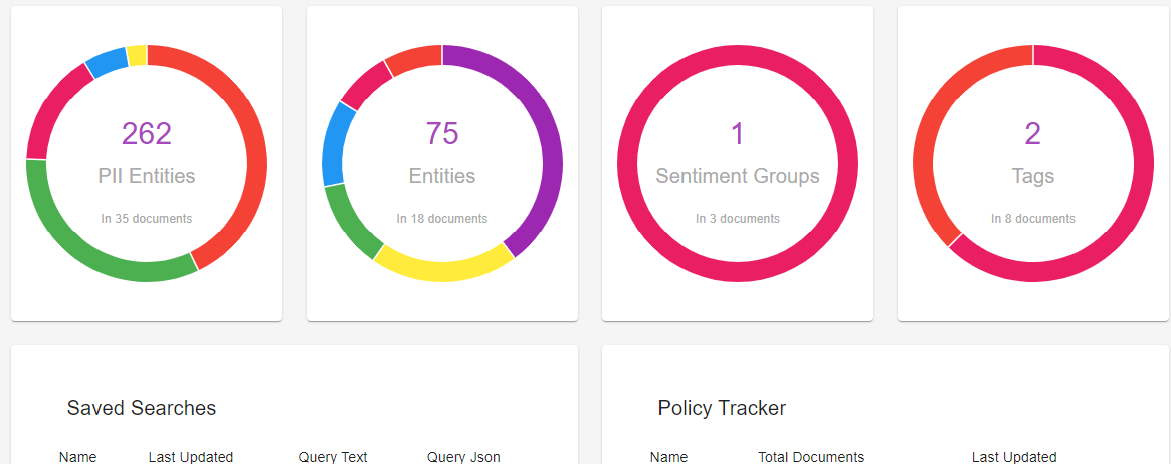

Data discovery is the process of finding relevant details and insights from the data collected from various sources. These insights help in making better data driven business decisions.
Legal discovery refers to information discovery for legal use cases like litigation support, early case assessment, ediscovery and regulatory compliance. Legal domain is documents heavy and in today's world an army of legal professionals are deployed to find, review, tag and produce large number of documents.
Enterprises of all sizes produce and consume varying quantities of data. Some of this data are structured, some are semi-structured and most are unstructured in nature. Each type of data requires specific handling and treatment. Structured data is usually well understood by the business users and most of the tools in an enterprise are built around the structured data. On the other hand unstructured data is usually massive and not utilized to its complete potential because of the lack of sophisticated tools to process and generate insights.
More than 80% of data in an enterprise is unstructured in nature. Emails, call center notes, survey responses, legal contracts, corporate documents, purchase orders, maintenance logs, support tickets etc. fall in this category. Understanding the knowledge locked away in unstructured data and using it alongside data points from structured data sources can immensely boost informed decision making.
Being the most widely used data form, unstructured data is the source of abundant insights for every department inside a business. Along with new opportunities it can pose significant risks to business if not understood well and on time. The insights from unstructured data can not only help businesses to manage risks, it can keep you ahead of competition also.
In many of the discovery use cases, the users will have some background on the data that is being processed and they will have some basic idea on what to look for. Katalyst takes a different approach here by treating every data corpus as ‘unfamiliar data’ to start with. Katalyst uses advanced NLP and AI to extract the key concepts and meaning of the data and uses that information to provide a guided discovery experience. This makes discovery super fast, precise and ultimately cost effective.
Guided discovery makes search suggestions/recommendations based on the content of data corpus. The idea is to automate the searching process ( which is mostly manual today ) and adjust the suggestions/recommendations based on user activity. Guided discovery relies on AI techniques to generate the keywords ,top phrases and other facts that are there in the document corpus.
Knowledge or insights in a document corpus ( data ) can be roughly represented by entities ( real world objects ), their properties and the relations between them. This information can be further enhanced by extracting other contextual information in the content like intent, sentiment etc
Katalyst's easy to use UI, role based access control and collaboration capabilities make document review faster, secure and precise.
Katalyst legal discovery software helps law firms and legal departments to respond to legal matters and internal investigations quickly. Finding relevant information involves filtering out non-relevant,redundant, obsolete and trivial data so that the amount of data to be reviewed is substantially reduced.

Katalyst employs recent advances in Natural Language Processing (NLP) and Artificial Intelligence (AI) to help in reducing the overall time taken for discovery and review and brings down the cost considerably.
Katalyst uses cutting edge techniques to understand the content without reading through each document in the corpus and generate easy to navigate visualizations to quickly browse through the data.
The various file formats range from the most common pdf, docx, xlsx, pptx etc. to scanned images of paper documents and audio files. Katalyst has the built-in capability to handle 100+ file types and make them discoverable.
Katalyst provides easy to use workflows to find, organize and tag documents. The role based access control system ensures controlled data access and review. The visualizations generated using AI models get better with usage and Katalyst provides out of the box support for legal, compliance and data discovery use cases like..
Katalyst risk intelligence and data analytics platform is built ground up with self service capabilities so that the users can control every aspect of their data and its processing. Users can just upload their documents and get started with discovery in minutes. With Katalyst, you can get deep visibility into your data quickly and efficiently.
Copyright © Contextree Software